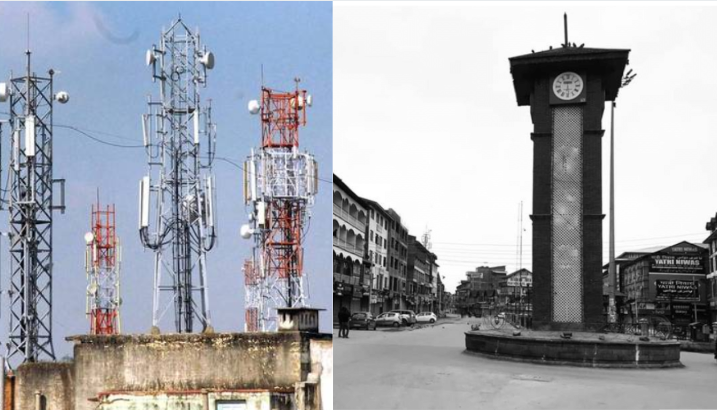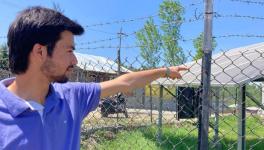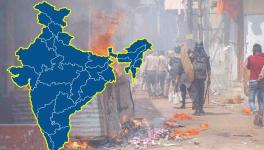COVID-19: Work From Home ‘Not an Option’ with Slow Speed Internet in Kashmir

People around the world are increasingly going into self-isolation and opting to work from home to prevent the spread of COVID-19 (novel coronavirus disease 2019). In Kashmir, however, people say working from home ‘is next to impossible’ due to the restriction on high-speed internet services in the Valley. An internet shutdown that began in last August following the abrogation of Article 370 and the bifurcation of Jammu and Kashmir into two union territories, was eased last month.
After remaining relatively unaffected by the virus, the Valley reported its first case of COVID-19 infection on March 12. Reacting to the situation, the authorities blocked roads in the Valley and have prevented people from leaving their neighborhoods. All schools, colleges, shops, and business establishments were closed and employees were asked to stay home. The administration also invoked colonial-era laws that prevented unlawful Assembly of four or more people -- powers more often used to quell anti-government protests in the region.
“The people are being advised to work-study from home, but this is impossible with 2G internet and limited fixed line internet connection. I would, therefore, request you to restore 4G internet services in Jammu and Kashmir at the earliest to ease the sufferings of people,” National Conference president and Member of Parliament from Srinagar, who was last week released from seven-month-long detention, said in a letter to the Prime Minister. The NC president said business and students have already been hit hard by shutdown after August 5, 2019, and are again suffering because of these restrictions.
Also read: Coronavirus Outbreak Shatters Hopes of Tourism Revival in Kashmir
Mudasir Khaliq, who works for an IT-company in Kashmir, wants to work from home to maintain social distance which he feels is necessary to contain the spread of COVID-19. The company allows him to work from home but slow internet makes it impossible for him to do so. “I develop applications that require downloading documents videos and files of a bigger size. It is next to impossible to work from home,” he said. He either has to shut his entire business or visit the office where the broadband connection is relatively faster.
Mudasir told NewsClick that the worries of his entire co-workers have mounted after the Valley reported the first case of COVID-19. The neighbouring Jammu region has three positive cases, and six cases have been reported from Ladakh with one from Kargil district.
Over the past eight months, low-speed internet has been restored on both mobile phones and fixed-line phones. However, the slow speed is also standing as a hurdle in getting information regarding COVID-19. “I am unable to watch online lectures for my studies. Leave studies, I am unable to even access information regarding the infection due to slow speed internet. The government should restore the internet services,” Mir Bareeq, a student, told NewsClick.
Javeed Pathan, who works for a local online magazine told NewsClick that with this internet speed it is impossible to work from home. He added that he has to visit the government facility to access internet, “I am a video journalist. How can I send a video file on 2G services? We take extra care while covering the pandemic but then I have no option to mingle with other people for relatively high-speed internet.”
Since the government opened access to the 2G services, the residents have been demanding high-speed internet services. However, the government has only been extending the 2G services every time it takes a fresh review. Continuing with the trend, the government on March 26 issued a statement wherein it maintained that speed would remain low until a new review is held.
Also read: Chorus for High-Speed Internet Grows in J&K After First Case of Coronavirus
Citing the restriction as “absolutely necessary in the interest of the sovereignty and integrity of India”, the government order noted that the restrictions would ensure public order and security of the state. It also asked the police chiefs of both Jammu and Kashmir divisions to “ensure” restrictions on internet speed.
In its first statement after the abrogation of Article 370 last August, a moderate faction of Hurriyat Conference on Friday urged the government to immediately restore 4G internet services.
The students are the worst hit due to these restrictions as they are unable to mitigate their losses with online learning. All educational institutions have been closed in the Valley affecting nearly 1.5 million.
The Private Schools Association of Jammu and Kashmir, encompassing nearly all private schools in the region, said that the government is denying students their right to education with this ban. “Schools have been closed in many countries but students there get to educate themselves via online classes or tools but Kashmir is the only place where the government ensures that there is a ban on offline as well as online education,” a statement issued by the association reads.
Apart from struggling to work from home, the residents are also facing difficulties in buying essentials from online websites. “The shopping sites do not open with this service. We are unable to buy essentials commodities like medicine and baby products online which ultimately forces us to venture out,” said a resident.
Get the latest reports & analysis with people's perspective on Protests, movements & deep analytical videos, discussions of the current affairs in your Telegram app. Subscribe to NewsClick's Telegram channel & get Real-Time updates on stories, as they get published on our website.
























